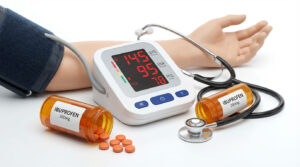Menopause! Not something a woman looks forward to, yet she comes in terms with the subtle changes and the noticeable transition, to overcome it all!!
Menopause-A bumpy stop
A woman’s life is endowed with ample of twists and turns. Included are the terminals of puberty,
pregnancy and the final bumpy menopause. Although, the transition within the different phases are
not very pleasant, the excitement of the upcoming changes in life shadows the unpleasantness. In
contrast, considering the association of aging with menopause; it is not something to welcome or
have a promise on the other side that is about to be fulfilled. The stepping in discomfort which one
has to go through with no benefit to be driven out of it, and changes in behavior makes it more unwanted.
Much is said across the world to mock this ultimate stage that puts an end to what has started with puberty.
Menopause, the phase in which menstrual cycle comes to a permanent halt. Also known to be a sign indicative of reproductive senescence. This means that the ovulation process and hormone production by the ovaries stops. Absence of menstrual periods for twelve months in a row is termed as natural or spontaneous menopause. It is seen to occur naturally in women within the age group between 42 to 52 years. Artificially menopause can be induced through surgical interventions such as bilateral oophorectomy, that might be done with or without hysterectomy. Chemotherapy or radiation therapy used for the treatment of certain conditions can also lead to premature menopause.
Variation in the hormonal balance during menopause puts a women through a variety of physical and behavioral changes. The transitions begin almost ten years prior to the final menstrual period, and this phase is referred as Premenopause. It is characterized by reduced ovarian hormone production and alterations in the length, pain period, bleeding patterns in menstrual cycle. Perimenopause also known as menopausal transition, on the other hand is the interim of irregular menstrual cycle preceding menopause. If menopause is considered to be the last menstrual period, the following phase of one year, wherein there is absence of menstrual cycle is termed as Postmenopause.
There are numerous changes occurring within a woman’s body throughout this entire time span. This makes her to present with many symptoms, broadly categorized into vasomotor (hot flashes), vaginal (vaginal dryness, vaginal atrophy, uterine prolapse or dyspareunia), insomnia (disturbed sleeping or deterioration of sleep quality) and mood changes (adverse or depressed moods). The presence of estrogen receptors in the urethra and urinary bladder, that are affected by loss of estrogen associated with menopause also causes urinary incontinence in some.
Steroid Hormone Levels-Says something about menopause
steroid hormones produced in the body of an individual can be placed under two classes, namely; corticosteroids
and sex steroids. As the name suggests, sex steroids are produced by the testes in men, whereas, ovaries and
placenta in women. Estrogen, progesterone and testosterone are considered to be the only sex hormones.
Though, not placed under sex steroids, luteinizing hormone (LH), follicle-stimulating hormone (FSH) and
gonadotropin-releasing hormone (GnRH) also plays vital role in sexual functions.
Owing to the association of ovarian failure to produce hormones with menopause and simultaneous hormonal alterations, the steroid hormone levels reveals a lot about the phases of menopause. Sex steroid and other related hormones that play a role in monitoring menopause are discussed below
Along with the steroid levels many other parameters are altered during the transitional phases of premenopause, menopause and postmenopause. Knowing the range of these markers help in early identification of menopause onset. This in turn facilitates in selecting the proper management and therapy based on a woman’s current health state.
Further, the parameters would indicate presence of any condition that the menopausal transition brought in or aggravated. Certain such indicators are as follows
- Low-density lipoprotein (LDL) level increases, raising the chances of heart diseases.
- Increased incidence of thyroid dysfunctions owing to altered thyroid hormone (T3,T4, TSH) levels, is reported in menopausal women.
- Parathyroid hormone (PTH) levels are found to be higher in postmenopausal women, which is indicative of bone health.
- calcium levels, as reduced estrogen production induces calcium loss, thereby affecting bone health.
- vitamin D levels fall post menopause due to the decrease in estrogen levels. As estrogen affects the enzymes that activates vitamin D production.
Hormone Replacement Therapy (HRT)- A promising option
Menopause is marked by the ovarian failure to produce female sex hormones estrogen and progesterone.
The menopausal changes in a woman is largely attributable to this. Hence the concept of Hormone Replacement Therapy has come to
picture, wherein, estrogen and progesterone in combination or estrogen and progesterone alone is used.
These hormones help in managing the hot flashes and urogenital symptoms, as well as reduces the chance
of osteoporosis. Also, they are believed to tackle the mood swings, libido and cognitive changes. Other forms
of Hormone Replacement Therapy like combinations of estrogen and testosterone or bisphosphonates has proven benefits in lessening
the chances of osteoporosis related to menopause.
Routes by which prescribed Hormone Replacement Therapy can be taken
- Oral pills While, low dose oral Hormone Replacement Therapy is given for symptomatic relief like reduction in hot flashes, standard dosage are useful for overall relief. Therapy can be scheduled in a cyclic or continuous manner.
- Transdermal patches Transdermal Hormone Replacement Therapy offers an advantage to women with underlying hepatic condition or hypertriglyceridemia.
- Vaginal suppositories Menopausal women having predominant vaginal symptoms are normally put on intravaginal Hormone Replacement Therapy, however, it also help reduce hot flashes to a certain extent.
Hormone Replacement Therapy-In tackling Menopause
The adoption of Hormone Replacement Therapy to make menopause manageable has been a selective approach since its acceptance in
1942, by the Food and Drug Administration (FDA). The controversies surrounding it, has always made the clear
minded use of this therapy a difficult decision. Extensive research over the years has shed some light on the
usage of Hormone Replacement Therapy, the pros and cons are put forth as under.
Benefits
- Provides relief from the hot flashes
- Help in reducing sleep disturbances
- Prevent osteoporosis
- Lessen vaginal symptoms
- Decreases genitourinary symptoms
- Reduce chances of arterial diseases (Ischaemic Heart Disease)
- Improve psychological symptoms
Adverse Effects.
- Oral Hormone Replacement Therapy increase the chances of gall bladder stone formation
- Long term use may impose risks of breast cancer
- Induces threefold increased risk of venous thrombosis
- Breast tenderness is reported due to the use of estrogen
- While stopping the Hormone Replacement Therapy drugs, unpredictable spotty bleeding can occur in some
- Increases heartburn, bloating and headache.
Two sides of the coin
- Menopausal symptoms can be managed to a great extent through Hormone Replacement Therapy
- Different ways by which Hormone Replacement Therapy can be taken help in deciding subject specific usage
- Initiation of Hormone Replacement Therapy only during the time of menopause is more suggested.
- Duration of Hormone Replacement Therapy can be decided by the doctor, which is again subject specific
- Level of severity of the symptoms must be considered to take a call on Hormone Replacement Therapy
- Single hormone therapy is more preferred over combinations
- Compound Hormone Replacement Therapy use needs to be consulted with the doctor for coexisting diseases
- Follow ups with the physician to rule out long term effects are recommended
- Type of menopause i.e. natural or artificial also influences the regime of Hormone Replacement Therapy
- Outcome of Hormone Replacement Therapy is also affected by age, ethnicity and time gap between menopause and initiation of therapy.
Conclusion
All in all, the panic Hormone Replacement Therapy has spread among its users and the physicians who prescribe them, is out of fear for
adverse side effects. Lack of extensive analysis and comparative studies has created some amount of confusion
in its usage. In a window period of 10 years within the onset of natural menopause, Hormone Replacement Therapy aids in reducing the
messiness of bothersome menopausal symptoms. Specifically, in situations where the non hormonal options
are not a suitable choice or has failed to provide relief to the condition. But again, Hormone Replacement Therapy used to handle menopause
has been linked to increased risk of stroke and ischemic heart diseases. Associated chances of developing breast
cancer with the usage of Hormone Replacement Therapy is another area of concern. The worries does not stop here, the form of therapy is
proposed to cause deep vein thrombosis and pulmonary emboli. Picking up sides on the use or disuse of Hormone Replacement Therapy is
therefore tricky.
Hormone therapies have been used for the treatment of numerous conditions. Over the bygone years usage can be seen to manage irregularities in menstrual cycle, delay menstrual periods, maintain pregnancies and also, to avoid conception. On the flip side when it comes to use for the management of menopause, why be so critical about its use? At the same time being aware of the related adverse effects of a therapy regime; it is somewhat not wise to adopt it, until the symptoms of menopause are truly unbearable. Meaning not to close the doors or totally drop the idea of its use but, to take an open minded consultation about the available options, and if it is really needed.








